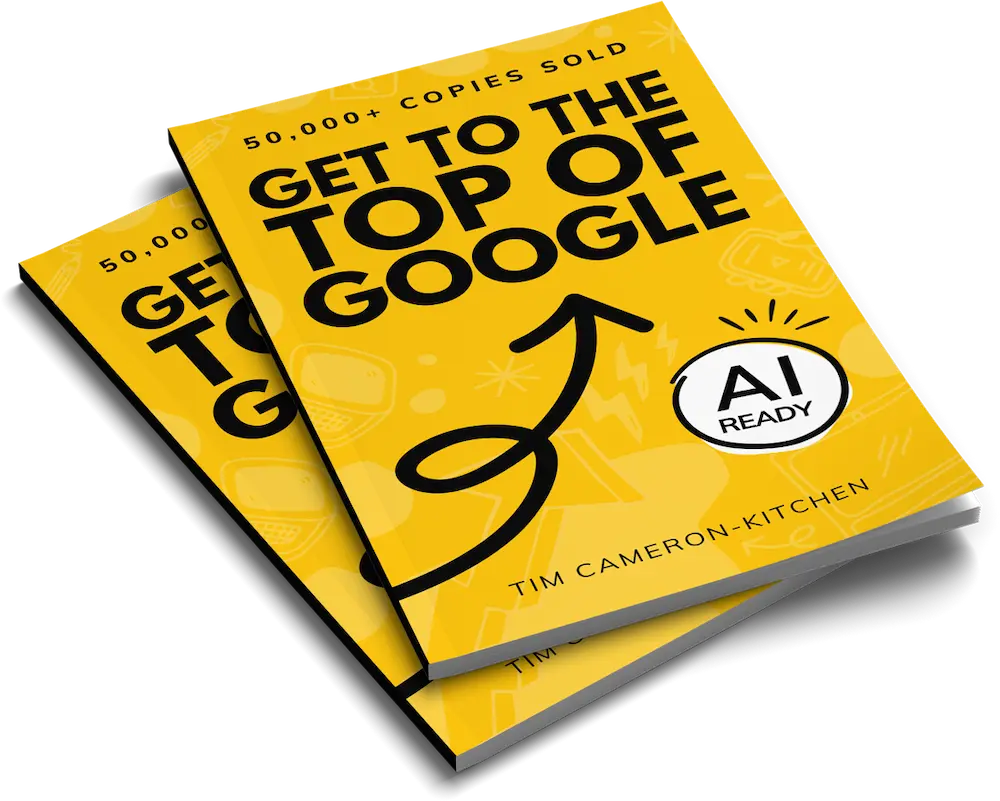
Get Weekly Marketing Tips
Join 30,000+ marketers and get the best marketing tips every week in your inbox
What Is PPC?
Pay-per-click advertising is a fast and effective way of getting your business or website shown at the top spot in search engines like Google by paying each time a user clicks on your ad.

An example of Google’s ads in their search results
Google’s results are ordered based on secret algorithms that are constantly updated. Some of the factors usually considered to determine a website’s position in the search results are traffic and engagement. This means that well-known websites naturally rank higher, while websites with low traffic and engagement end up at the bottom of the pile. These are called organic results, and the ranking in these results can be improved over time with search engine optimisation (SEO) work.
SEO requires constant optimisation of your website content and can take a couple of months to show significant improvements. With PPC, however, your website can appear at the top of Google’s search results immediately after setting a campaign live.
How Does PPC Work?
As part of your campaign setup, you will need to select the keywords your target audience might be using to look for your products or services on Google. These keywords will be verified by Google each time a user performs a search query, and if they match with the keywords in your list, your ad will be shown.
To determine the positioning of the ads among advertisers, Google will consider the cost per click (CPC) advertisers are bidding for on that keyword. However, your CPC will also be determined by the quality of your ads and website for that keyword.
For example, if one of your competitors has a lower bid than you on one of your keywords, but their ad copy is more relevant for that keyword and their landing page is better optimised and easy to navigate, they may pay less than you to rank higher in the results.
This is why it is important to look at the big picture and review your current digital marketing strategy — including your website — before starting any digital marketing campaign.
We’ve done thousands of no-strings-attached website reviews for many industries so far. So why not get yours now?
What Can PPC Do for My SME?
At this point, you might be asking yourself, “Why is this all relevant to me?” Although some of the benefits of PPC may seem obvious, you may be uncertain of how it can work for your business. Worry not! We will next explain why PPC is especially suited for SMEs in 2021.
1. Quick Launch
Sometimes SMEs need fast launching of their advertising campaigns. Maybe you don’t have an internal marketing team that can foresee the campaign needed for your newest product or service, or perhaps one of your competitors suddenly disclosed a big promotion, and you need to act fast unexpectedly.
Whatever the reason behind your need to launch a PPC campaign, we know that acting fast makes all the difference for SMEs and can determine the success or failure of a marketing campaign.
Does this mean that we can launch your campaign the same day you sign up with us?
Unfortunately, it’s not THAT fast, but there is a good reason for that. We still need to research your business, industry, competitors and target audience and put together a plan tailored to your business.
Once the strategy is approved, we will produce the campaign structure, and specialised advertising copywriters and designers will create the ads. Once you approve your ads, we will proceed with the campaign setup and set the ads live.
The good news? This is all done within the first month of your campaign, so by the end of your first month, you can have highly targeted new ads up and running.
2. Low Initial Investment
You might have heard that “there is no minimum budget to start a Google Ads campaign”. While this is true, there is a minimum budget required for your ads to get the exposure they need, be competitive for your target audience and stand a chance of succeeding in your goals — whether that’s brand recognition or achieving leads or sales.
Advertising is becoming more complex and competitive as you read this post, so the recommended budget for your business needs to be calculated manually by a PPC expert who can analyse your audience, competitors and possible keywords for your campaigns.
Want to know an estimated budget for your campaign? Our highly skilled PPC Ninjas can put together a FREE, no-obligation review of your current PPC Ads and recommend a budget for your campaigns.
The initial budget for PPC campaigns is less expensive and much more cost-effective than launching a traditional advertising campaign (radio, TV, billboards, etc.).
In most cases, PPC also outperforms other digital marketing channels such as organic search, email marketing and social media in terms of cost-effectiveness and time needed to obtain results.
However, your digital marketing strategy will always perform better if you combine PPC with other channels, as customers usually interact with more than one channel before completing a conversion on the website.
3. Selective Targeting
With PPC advertising, you can be very specific about the keywords and audiences you want to target. As part of our initial PPC plan, we will research your target audience and identify the keywords they might be using to look for your offering on search engines.
You might be wondering, “What’s new in 2021 about targeting?” And the answer is that a lot has changed recently. We have seen an increase in restrictions about tracking users’ online behaviour.
There are now more options for users to easily state if they are willing to share their data, to which most users — unsurprisingly — opt out. This significantly affects audience targeting since we can’t collect that data to cluster users by behaviour when they opt out of tracking. This way, highly relevant audiences like “Shoppers: People who enjoy shopping and view it as a pastime” will likely decrease in size, and we will need to rely more than ever on keyword targeting. This is why a complete initial analysis and an on-point campaign structure will make all the difference to your campaign’s performance.
One of the most common opportunities we find when we review Google Ads accounts as part of our free website and marketing review is the need for new keyword research, keyword refining and account restructure.

Screenshot of a conversion path within Google Analytics.
4. Data-Driven Decision Making
Test, measure and repeat. This is the base of digital campaign optimisation and can be applied to PPC in many aspects too. So make data-driven decisions to make sure you are getting the most out of your ad spend.
Some options to A/B test are:
- Automated bidding strategies
- It might sound like you can just click on “maximise conversions” in your campaign, sit back and watch conversions multiply, but it’s more complicated than that. Automated bidding strategies only perform well if Google has gathered enough quality conversion data, so in most cases, there is a need to do a deeper analysis and answer questions such as:
- Is there enough data?
- Is the quality of the data good enough, or could it be misleading?
- Is the current cost per acquisition (CPA) at a good point, or should you change the strategy to “target CPA”?
- It’s also highly recommended to set a campaign experiment to test your current strategy against the new one.
- Testing automated bidding strategies is recommended now more than ever, especially since conversion data is even more limited than before now that users can opt out of conversion tracking.
- It might sound like you can just click on “maximise conversions” in your campaign, sit back and watch conversions multiply, but it’s more complicated than that. Automated bidding strategies only perform well if Google has gathered enough quality conversion data, so in most cases, there is a need to do a deeper analysis and answer questions such as:
- Location targeting
- Optimise your biddings based on your location performance to maximise your results. This means you can decrease or increase your biddings and exclude or include locations. You will need to gather enough data to make this kind of decision.
- Ad copy and landing pages:
- In most cases, the user goes through at least three steps before completing a conversion — entering a search query, clicking on an ad and visiting a landing page. (Please note that with lead form extensions or call extensions, the conversion action can be completed within the ad.)
- The ad and the landing page play a vital role in the final conversion achievement, so it is essential to test variations to make sure you are encouraging users to complete the conversion and providing an easy way to do it on the landing page.
5. Remarketing
Remarketing or retargeting happens when you show ads to audiences who have previously interacted with your business’s website or mobile app somehow. There are many uses for remarketing campaigns, including:
- Upselling to previous buyers.
- Targeting users with abandoned shopping carts in an eCommerce website to encourage them to finish the purchase.
- Remarketing to your top of the funnel audience who is at the “research phase” and visited your blog to encourage them to request a demo of your product or service.
As mentioned before, tracking has recently become more difficult. However, we need to track users’ activity on your website or app to identify them in a remarketing list. So, can we still include remarketing in your campaign strategy? The answer is yes, although we will need to pay attention to the size of the remarketing audience to make sure it is suitable to run ads. Keep in mind the following recommendations:
- The remarketing list must have at least 100 users for display ads and 1 thousand for search remarketing ads during the last 30 days.
- Consider uploading a customer list manually to ensure you reach the necessary minimum and have a large enough audience.
- If your audience is still too small, create a combined audience using a remarketing audience and a custom audience based on interests or previous search queries.
PPC advertising as we know it is surely changing in 2021. If you need expert help to make sure your ads are compelling and up to date with the latest best practices, request your free digital marketing review now.




















